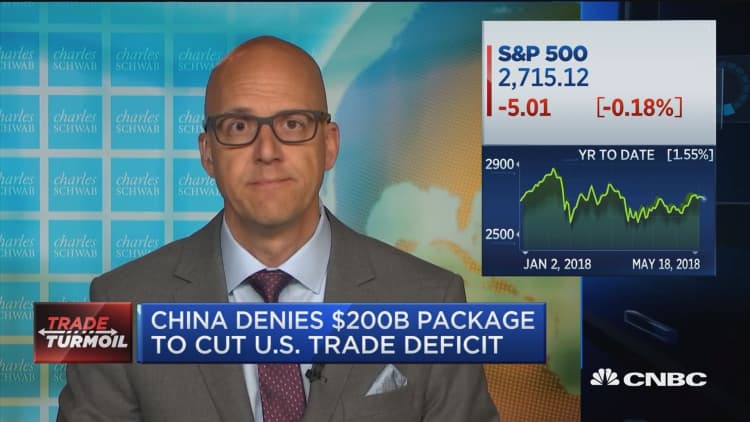
The and Nasdaq composite closed lower on Friday as tensions between the U.S. and China weighed on investor sentiment while both countries continued negotiations on trade.
The broad index fell 0.3 percent to 2,712.97 with energy and financials lagging. The Nasdaq composite declined 0.4 percent to 7,354.34. The Dow Jones industrial average bucked the negative trend, closing just above the flatline at 24,715.09 as Boeing and Caterpillar shares rose 2.1 percent and 1.3 percent, respectively.
"All of the news we're getting on trade is incremental, unfortunately," said Art Hogan, chief market strategist at B. Riley FBR. "Unless you're in the room, it's hard to get a feel for how these negotiations are going."
On Thursday, the two largest economies in the world began the second round of trade talks. But President Donald Trump told reporters he doubted the negotiations would be successful.
Later, reports emerged saying China would offer the U.S. a $200 billion trade surplus cut. Those reports, however, were quickly denied by a Chinese ministry spokesman on Friday. "This rumor is not true. This I can confirm to you," the spokesman said. "As I understand, the relevant consultations are ongoing and they are constructive."
Tensions between the U.S. and China have increased in recent months as both countries have hit each other with tariffs targeting some of their exports.
"Is it a concern? Yes. How do you traded? We're not sure," said Ernie Cecilia, CIO of Bryn Mawr Trust. He noted, however, he is still constructive on the stock market as earnings and economic growth remain solid.
The major indexes posted slight weekly losses. The Dow and S&P 500 both fell 0.5 percent for the week, while the Nasdaq pulled back 0.7 percent. The move lower this week took place after the averages jumped more than 2 percent last week.
Helping push stocks lower this week were higher interest rates. The benchmark 10-year note yield broke above 3.1 percent for the first time since 2011 this week, while the two-year yield traded at its highest level in nearly 10 years. Fears of the Federal Reserve tightening monetary policy faster than expected have pushed investors to sell Treasurys recently.
In corporate news, Nordstrom shares dropped nearly 11 percent after the Seattle-based retailer reported same-store sales that missed analyst expectations. The miss was enough to overshadow better-than-expected revenue and earnings for the first quarter.
Applied Materials also dropped 8.3 percent after the company issued guidance that disappointed investors.



